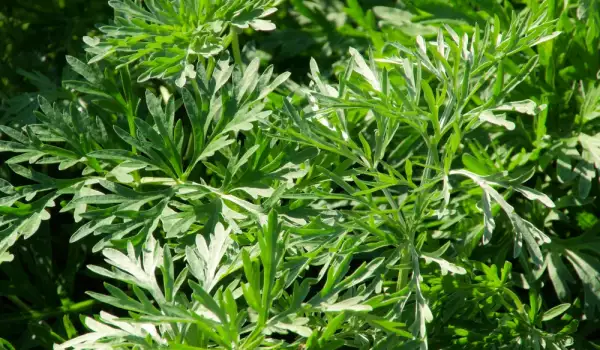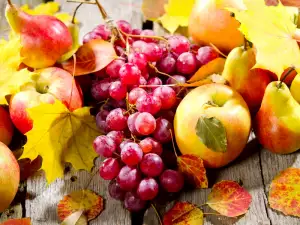Ordinary wormwood (Artemisia absinthium L.), also known as white wormwood and bitter wormwood is a perennial herbaceous and fragrant plant of the Asteraceae family (Asteraceae (Compositae). It grows mainly in meadows around bushes, grass and stony places. Their origin is in Europe and Siberia, but it is now widespread in the United States.
Wormwood is deeply connected to traditional medicine and beliefs. It is believed that the aroma of this herb harvested during the waning moon is able to chase any evil spirits from your home. It is used in small doses, such as smoking the house with it for a short time. There is belief that it restores harmony with nature and the best way to use wormwood to hang in your home.
Types of Wormwood
In wormwood, there are quite well-known species such as mugwort (black wormwood Artemisia vulgaris L), Tharos ( tarragon ) and southwood (southwood). This herb has a very aromatic leaves, and some species are medicinal, others are used for seasoning, and others are an important part of the pastures. The unifying feature of all types of wormwood is that it has an extremely bitter taste.
Wormwood has a kind of pleasant aroma and strong bitterness. It blooms from July to September, found in grassy and rocky places around bushes and gardens, along fences and roads, mainly in plains and foothills.
White is silver gray wormwood herb, which in ancient times was used to treat menstrual disorders in women and in rheumatism and others. Wormwood is one of the most common plants in Balkan folk medicine, Hippocrates even knew its advantages.
Mainly its leafy flowering top parts, with yellow flowers, are cut about 25 cm from the top and collected at the beginning of flowering. Unlike white, black wormwood is dark, bare, and white beneath the upper petals.
Composition of wormwood
The leaves and stalks of wormwood contain a palette of different substances. Stems of white wormwood contain between 0, 5-2% essential oil (Oleum Absintjii), whose main components are oxygen derivatives of bicyclic terpenes - alcohol and ketone, thujone and Azulene sesquiterpene. Wormwood has sesquiterpene lactones, organic acids, provitamin A, vitamin B6, vitamin C, carotene, isovaleric and acetic, malic and succinic acids, etc.. According to Japanese experts. it is an active antibiotic.
Application of wormwood
For centuries, even millennia, wormwood was used with medicinal purposes. An interesting fact is that ordinary wormwood is used to prepare absinthe, because it contains an ingredient called thujone. Some types of wormwood are used for food by the larvae of several species of Lepidoptera. Wormwood is also used to repel fleas and moths, as well as to flavor beer and wine. Aperitif "vermouth" (from German "Wermut" - wormwood) is based on wine flavored with aromatic herbs, but primordial vermouth is seasoned with wormwood.
Useful properties of wormwood
White wormwood is applied only on prescription and has a tonic- like effect, improves digestion, and is anti-inflammatory. It is used for gastritis and other inflammations of the stomach, liver and gall bladder diseases, bad breath, anemia, insomnia, intestinal parasites, menstrual irregularities, angina pectoris, bronchial asthma, eczema, wounds, insect bites and more.

Usage: Mix 1 tsp herb in 200ml water for 2 hours. Take 100 ml before lunch and dinner and an infusion can be made.
Mixed with wormwood tea for stomach ailments
1 teaspoon chopped Wormwood, ½ tsp gentian root, ½ tsp red cilantro, 1 cm stick cinnamon and half a teaspoon of orange zest. All this soak with 1 cup boiling water. Steam for 10 minutes and strain. Drink a sip after a meal.
Wormwood works well for bronchial and stomach problems, a tonic for flu and colds, temperature decreasing effect, and an anti-inflammatory influence on the pineal gland.
The complex of active ingredients in wormwood stimulates the secretion of digestive glands, gall bladder and pancreas and also stimulates appetite and improves digestion. This makes wormwood an effective tool in the fight against anorexia or lack of appetite.
Essential oil of wormwood acts as a local anesthetic and as a heart stimulant, on the central nervous system. It is used internally to improve circulation and externally - for arthritis, sprains, neuralgia, arthritis, flat feet.
Dangers of wormwood
White wormwood should not be used in inflammation of the kidneys because it may cause irritation. It is particularly important that wormwood should not be given to young children. Large doses of the herb can be toxic, and continued intake of wormwood in high doses sometimes leads to nausea, vomiting, hallucinations and convulsions.
Even perfectly healthy people should not drink more than three cups of wormwood tea a day and should not be taken over a period of four weeks, as this may cause damage to the central nervous system. Remember that wormwood is always used in small doses for a short period of time.

















